A Reflection For Christmas Eve: O Magnum Mysterium
- Blog A Reflection For Christmas Eve: O Magnum Mysterium
|
O magnum mysterium, |
O great mystery, |
Tonight, at Midnight, we—and all of heaven—will rejoice at the birth of Our Lord, Jesus Christ.
Hail, and blessed be the hour and moment
At which the Son of God was born
Of a most pure Virgin
At a stable at midnight in Bethlehem
In the piercing cold.[2]
The time and place of this Birth was no coincidence.
Nothing ever is.
O Uncreated Wisdom! that art so soon to make Thyself visible to Thy creatures, truly Thou disposest all things.
It is by Thy permission, that the Emperor Augustus issues a decree ordering the enrolment of the whole world. Each citizen of the vast Empire is to have his name enrolled in the city of his birth. This prince has no other object in this order, which sets the world in motion, but his own ambition. Men go to and fro by millions, and an unbroken procession traverses the immense Roman world;
men think they are doing the bidding of man, and it is God whom they are obeying.
This world-wide agitation has really but one object; it is, to bring to Bethlehem a man and woman who live at Nazareth in Galilee, in order that this woman, who is unknown to the world but dear to heaven, and is at the close of the ninth month since she conceived her child, may give birth to this Child in Bethlehem, for the Prophet has said of him:
"His going forth is from the beginning, from the days of eternity. And thou, O Bethlehem! art not the least among the thousand cities of Juda, for out of thee He shall come."[3]
O divine Wisdom! how strong art Thou, in thus reaching Thine ends by means which are infallible, though hidden! and yet, how sweet, offering no constraint to man's free-will! and withal, how fatherly, in providing for our necessities![4]
“A Child has been born to us, a Son has been given to us.”[5]
A baby.
A tiny, defenseless, weak baby, born to a young mother and her loving husband.
Centuries later, we still celebrate this Birth.
“Celebrate” is such a weak word… we rejoice.
We give thanks.
We praise God.
This evening, let us reflect on the gift God gave us, centuries ago. Dom Gueranger sets the scene:
There are three places on this earth of ours which we should visit tonight. For two of them, it can only be in spirit.
The first is Bethlehem, and the Cave of the Nativity, which is Bethlehem’s glory. Let us approach it with respectful awe, and contemplate the humble dwelling which the Son of the Eternal God chose for His first home. It is a Stable in the hollow of a rock, just outside the city walls. It is about forty feet long by twelve in width. The ox and the ass, as spoken by the Prophet, are there, standing near the Manger, mute witnesses of the Divine Mystery to which man refused to lend his own dwelling.[6]
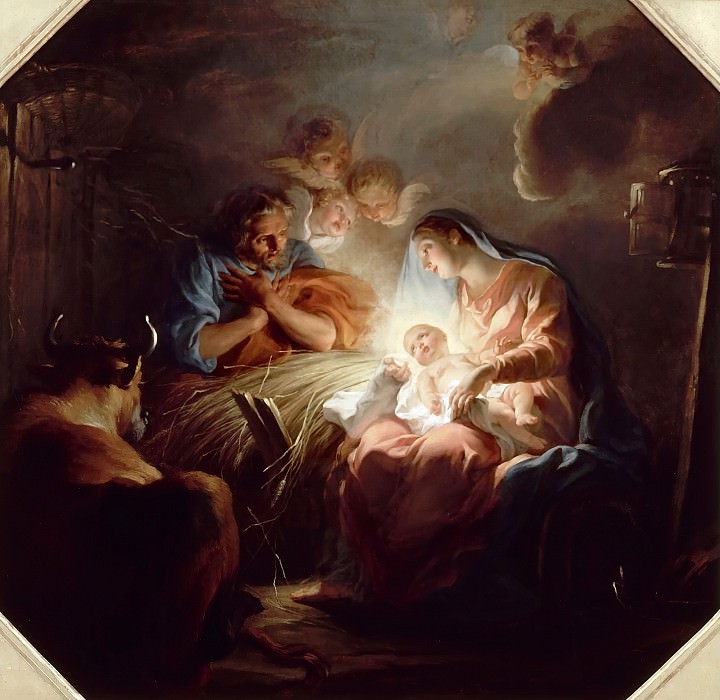
O magnum mysterium, et admirabile sacramentum,
ut animalia viderent Dominum natum, jacentem in praesepio!O great mystery, and wonderful sacrament,
that animals should see the new-born Lord, lying in a manger!
Mankind had been awaiting its Savior for centuries.
How is it that the only witnesses to His birth were animals?
O magnum mysterium.
O great mystery.
The Babe’s mother and father are, of course, present, witnessing the greatest gift given to mankind: a Savior.
Joseph and Mary enter into the Stable-Cave. It is night, and all nature is buried in silence; but these two Hearts are sending up their praise and adoration to God, Who thus deigns to atone for man’s pride.
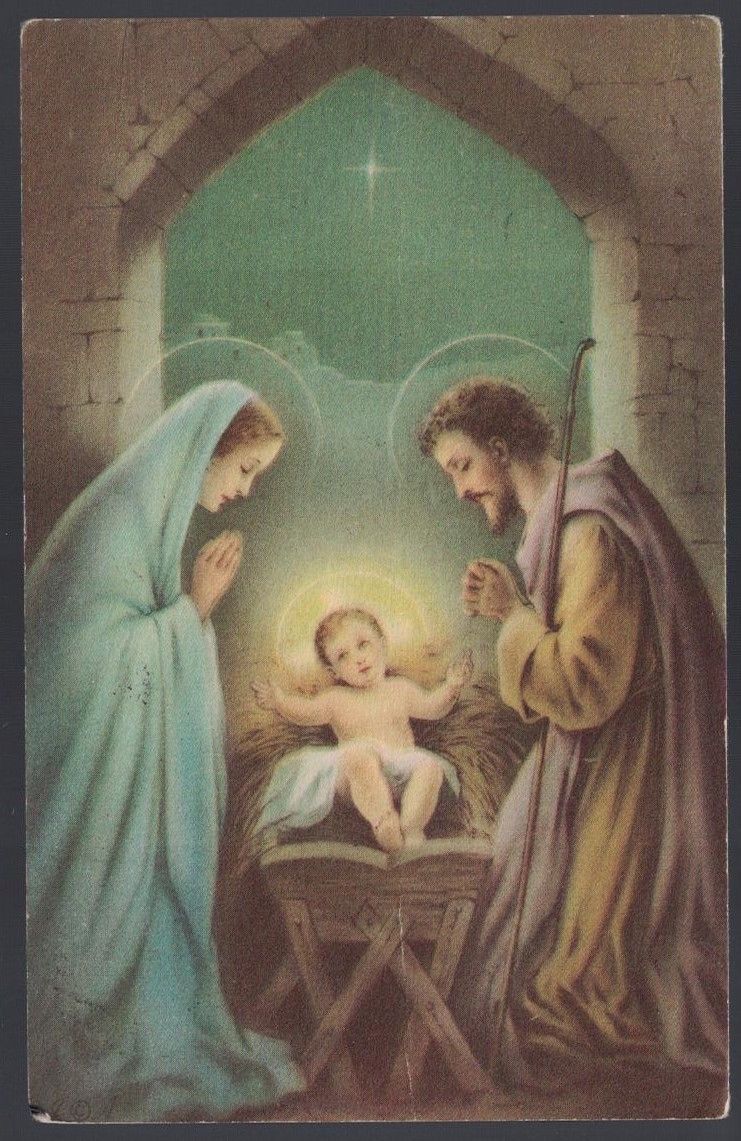
And soon, the Baby Himself…
Our Jesus, on his part, now that He is about to leave the sanctuary of his Mother’s womb, and make His visible entrance into this world of sin, adores His Heavenly Father, and, according to the revelation of the Psalmist, which is commented by St Paul in his Epistle to the Hebrews, thus speaks:
Sacrifice and oblation thou willedst not;
but a Body thou hast fitted unto me.
Holocausts for sin did not please thee.
Then said I, behold I come.
In the head of the Book it is written of me that I should do thy will, O God![7]
All this was happening in the Stable at Bethlehem, about this very hour of the Night. The Angels of God were singing their anthems of praise to this, His incomprehensible mercy towards His rebel creatures. They looked down with admiration upon the Mother of their God, the Mystical Rose, whose hidden beauty was soon to bloom and fill the world with its fragrance.
O happy cave of Bethlehem! scene of these stupendous Mysteries!
Who is there that can forget it tonight?
Who is there that does not love it above the richest palaces of Kings?
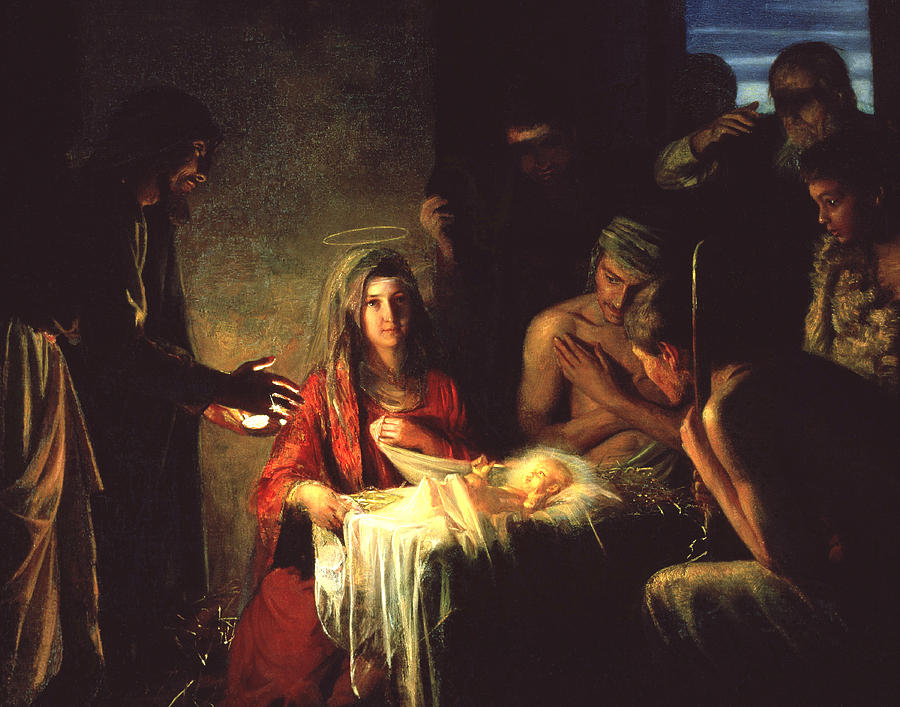
When we reflect on what God has given us tonight, there is no way that Christmas can be anything less than a time of celebration, joy, and gratitude.
The Son of God has become small to make us great;
He has been given to us so that we may give ourselves to Him.
He has come to show us His love so that we can respond with ours.
Let us receive Him with affection.
Let us love Him and turn to Him with all our needs.[8]
The outpouring of love from that manger in Bethlehem fills us with the love of the Father, the Son, and the Holy Spirit. Because He is good, He graces us with the gifts to love Him back. Not with a commensurate love. No. That is never possible.
His love is too great, and we are too small.
But in our little ways; ways that seem great for us. We do what we can to show Him how much we love Him. He is grateful, I am certain, and smiles on our efforts. For it is only by His will and grace that we can even desire to please Him.
Sacred music is one of these ways.
To some, He graces with the talent to create music that raises hearts and minds to Him, arousing a yearning for the transcendent beauty that He is.
To others, He gives the ability to sing or play this music into reality.
This evening, as we commemorate the birth of our Savior in Bethlehem, the House of Bread, we will receive Him, “our Bread, the nourishment and support of our life."
“With God as our food, we cannot die.”[9]
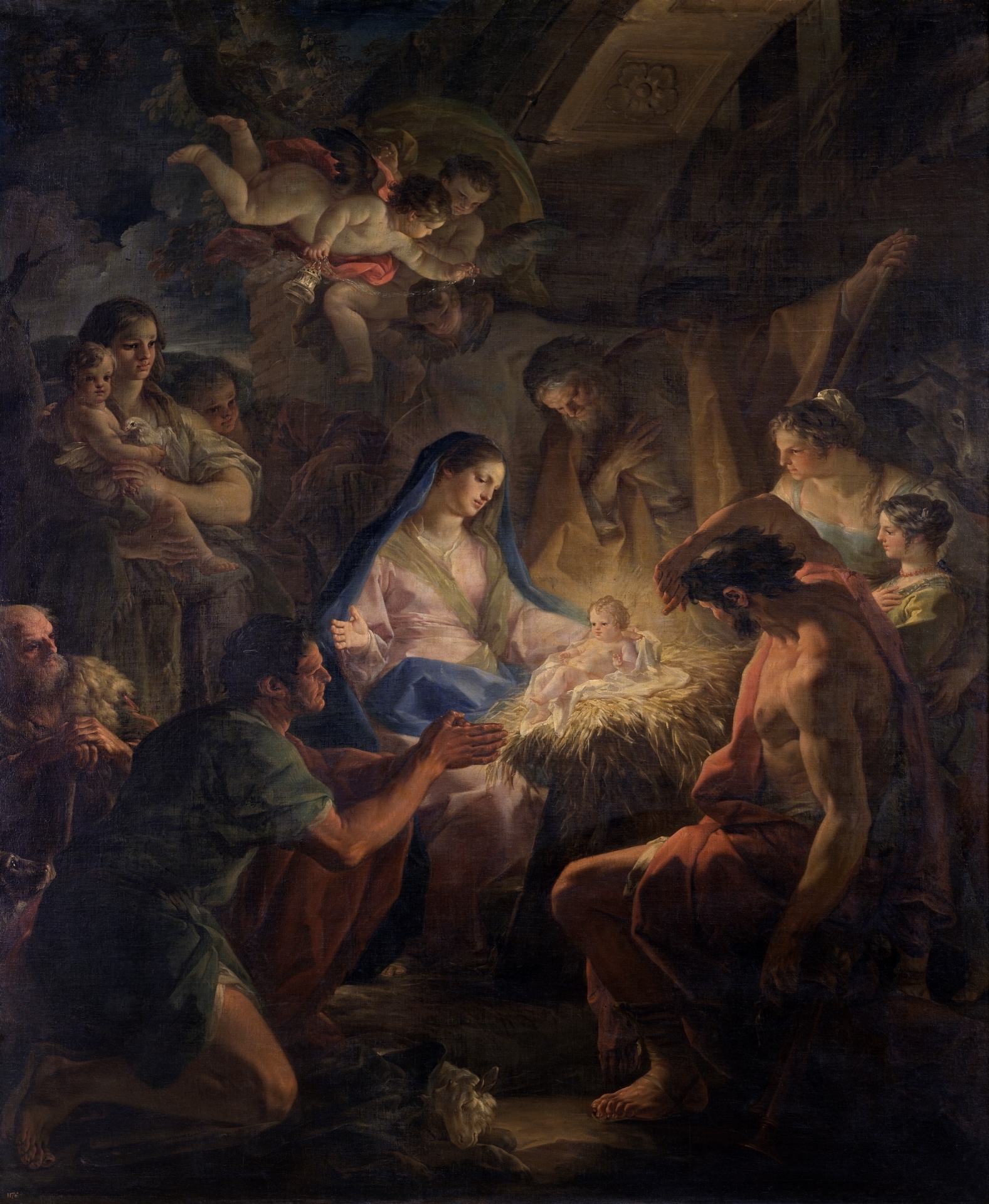
As the faithful receive Him on their tongues, little drummer boys and girls around the world will pa rum pum pum pum for their newborn King, bringing their finest gifts as they sing Morten Lauridsen’s masterpiece, O Magnum Mysterium.
|
O magnum mysterium, |
O great mystery, |
This “quiet song of profound inner joy”[11] reflects on the mystery of Christ’s birth in a manger, surrounded by animals. But it is the two dissonant G sharps—sung by the altos on the word Virgo (at 3:07 and 3:29)—that remind listeners that this Birth—full of joy as it is—is the beginning of the Passion of the Babe in swaddling clothes. Both He and His mother—the Virgo herself—know that this Child is born to die for the sins of mankind, and this magnificent, glorious night, full of profound inner joy, is also suffused with sadness for the pain that this Baby will bear for our sakes.
Truly, as Bishop Fulton Sheen said, Calvary casts its shadow over Bethlehem.
As this sacred music is sung, let us, the faithful, visit the third of the sanctuaries mentioned by Dom Gueranger:[12]
This third Sanctuary is near us;
it is in us;
it is our own heart.
Our heart is the Bethlehem that Jesus desires to visit, and in which He would be born, there to live and grow unto a perfect man, as St Paul expresses it.[13]
Why, after all, was He born in the stable of the city of David, but that He might make sure of our heart, which He loved with an everlasting love, and so ardently that He came down from heaven to dwell in it?
Mary’s virginal womb held Him but for nine months;
He wishes us to keep Him for ever in our dwelling!
This evening,
this Christmas,
from now until our lives end,
let us never forget the gift we received in that manger so long ago.
We were in His heart before time began.
We were in His heart as He waited in Mary’s womb.
We were in His heart in the manger.
We were in His heart when He died for us on the Cross.
We have been in His heart and will be for all of time.
It is our turn, now, to welcome Him into ours and never do anything to make Him leave.
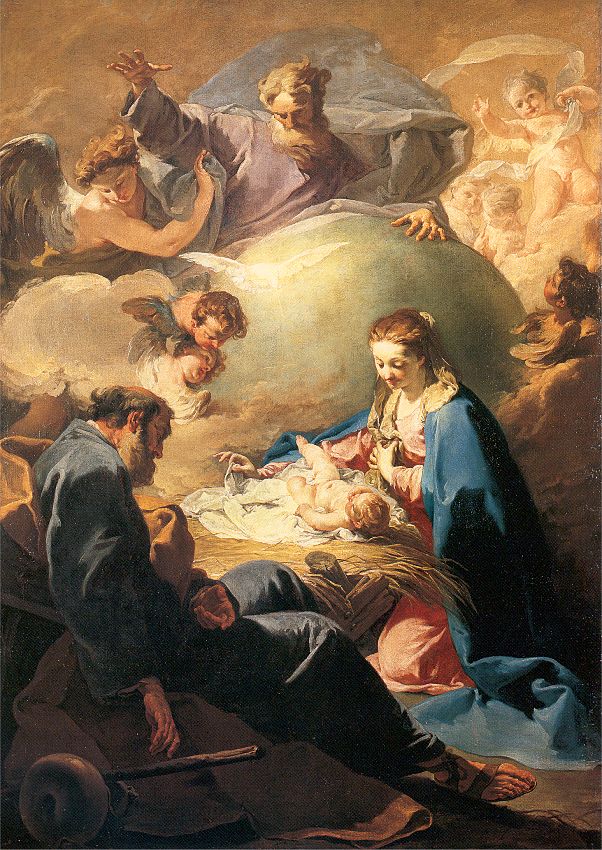
O heart of man, thou living Bethlehem, hold thyself in readiness, and keep a glad feast! Already, thou hast prepared thyself for this union with thy Jesus by the confession of thy misdeeds, by the contrition of thy sins, and by the satisfaction thou hast made for them. Now, therefore, be all attention:
He is coming in the Midnight.
Let Him find everything ready, ready as were the Stable, the Crib and the Swaddling-clothes. True, thou hast nothing to offer Him like what Mary and Joseph had — she, a Mother’s caresses; and he, the most solicitous and tender care; but thou hast an adoration and a love like those of the poor Shepherds, and these thou must offer.
Like the Bethlehem yonder in the far east, thou art living in the midst of heresy, of infidelity, and of men who ignore the divine mystery of divine love: secret then, but hearty, must be thy prayers, like those which are ascending this night to heaven from the few faithful ones who are assembled in the Holy Cave with the Sons of St Francis; for in that unfortunate Palestine, which has been a slave to the most degrading errors for this last thousand years, there are still a few who know and love God.
On this glad Midnight, let thy soul become like that splendid Basilica of Rome, which possesses the two treasures, the Holy Crib and the venerable Portrait of the Virgin Mother. Let thy affections and thoughts be pure as the white marble of its pillars; thy charity bright as the gold which glitters on its ceiling; thy deeds shining as the countless tapers which light up its beauty, and turn this night into the glare of a summer noon.
Thou must learn, too, O soldier of Christ! to use a Christian’s weapons; thou must fight thy way to the Crib of thy Jesus; thou must fight for thy position there, and maintain it by the unbroken loyalty of thy love; thou must fight for the happy consummation of thy victory:
Union eternal with Him.
Treasure up these holy sentiments, and let them console and sanctify thee during these moments which precede the coming of Emmanuel into thee.
O living Bethlehem! there is a word which heaven gave thee for these moments; take it up, and let it be thy ceaseless prayer;
Come, Lord Jesus! Come![14]
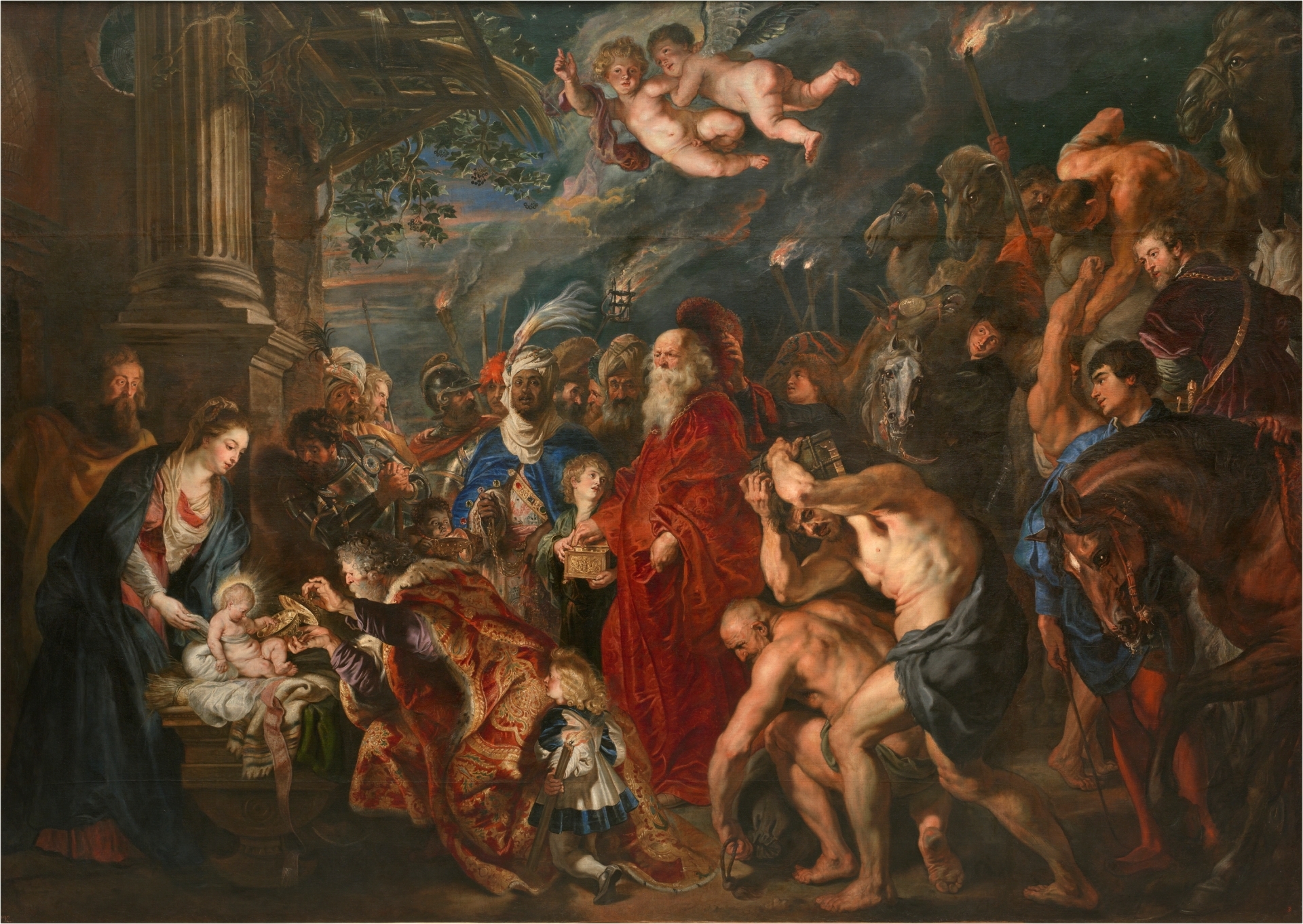
[1] Liber Usualis, Responsory at Matins on Christmas Day
[2] St Andrew Novena
[3] Mich. v. 2; St Matth. ii. 6
[4] The Liturgical Year, Dom Prosper Gueranger, December 17
[5] Isaiah 9:5
[6] The Liturgical Year, Dom Prosper Gueranger, Christmas Day: The Hour Before the Midnight Service
[7] Heb. x 5, 6, 7
[8] St Alphonsus de Liguori, Meditations on Advent, Christmas, and Epiphany
[9] The Liturgical Year, Dom Prosper Gueranger, Christmas Day: The Hour Before the Midnight Service
[10] Liber Usualis, Responsory at Matins on Christmas Day
[11] Morten Lauridsen, in conversation with Bruce Duffie
[12] The second was St Peter’s at the Vatican, but that’s not relevant to this meditation
[13] Eph. iv 53
[14] Apoc. xxii 20, The Liturgical Year, Dom Prosper Gueranger, Christmas Day: The Hour Before the Midnight Service
All Images in the public domain: The Nativity, Bartolomé Estebán Murillo; Adoration of the Shepherds, Gerard van Honthorst; Nativity, Noël Nicolas Coypel; Vintage holy card; The Birth of Jesus Christ, Carl Bloch; The Adoration of the Shpherds, Corrado Giaquinto; The Nativity with God the Father, Giambattista Pittoni; Adoration of the Magi, Peter Paul Reubens.
Related Content


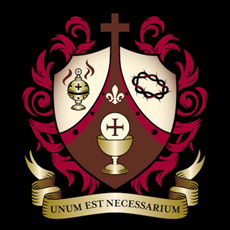

Comments